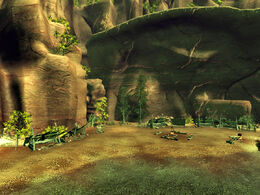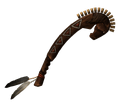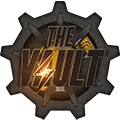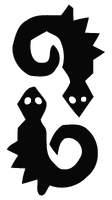Fallout faction overhaul project This article is within the scope of the Fallout faction overhaul project. This project is dedicated to organizing and improving the quality of the various faction pages. If you want to participate, please check the project page. |
Dead Horses | ||||||||||||||||||||||||||||||||||||||||||||||||||||||||||||||||||
| ||||||||||||||||||||||||||||||||||||||||||||||||||||||||||||||||||
| ||||||||||||||||||||||||||||||||||||||||||||||||||||||||||||||||||
 Dead Horses camp in the Zion Canyon | ||||||||||||||||||||||||||||||||||||||||||||||||||||||||||||||||||
The Dead Horses are a tribe of hunter-gatherers from Dead Horse Point in 2281.
Background[]
According to New Canaanite research, the tribe known as Dead Horses is composed of the descendants of refugees from Res, east of the Grand Canyon, specifically American citizens, Native Americans, European tourists and other groups.[1] Over the generations, they developed a distinct tribal identity, at the expense of their technological powers, and their own language: a combination of Res and tongue spoken by Res' visitors.[2] By 2281 they are living at the Dead Horse Point State Park.[3]
Much of their combat prowess and ability at that point comes from Joshua Graham, who taught them how to use firearms, basic tactics, how to maintain their rare pre-War equipment.[4] Graham visited them once, as a Legate of Caesar. The second visit came when Graham returned to New Canaan after being humiliated by Caesar.[5][6] Joshua decided to help the Dead Horses again after New Canaan's destruction. Graham became their acting war chief, which proved especially advantageous in their conflict with the White Legs. He convinced a large group of them to migrate from Dead Horse Point to Zion Canyon to help the Sorrows.
Society[]
Their tribe is located at Dead Horse Point in the Eastern Virgin. Most of the Dead Horses are designated as scouts. The full-fledged scouts occasionally leave chalk murals and pictographs to guide the less experienced ones during reconnaissance or to lead warriors to good hunting grounds.
The Dead Horses are individualistic in the way that they govern their personal lives. They are democratic in matters concerning the tribe as a whole. Usually, the only decisions made autocratically are those regarding conflicts with outside groups. In this sphere Joshua Graham has been given complete authority to dictate the actions of tribal warriors in times of war. Joshua stated he desired little to do with the way the tribe conducted its personal matters, believing that there may be better men whose example should be followed than his own.
With the exception of Follows-Chalk, the Dead Horses believe that pre-War areas are taboo and are marked as such with white hand prints.[7][8] The majority of the tribe have no desire to leave Zion Canyon for the outer Wasteland as they feel they have a duty to protect their home. They hunt bighorners for food, marking themselves with tattoos to commemorate when they hunt and special occasions, like if a youth go on his first hunt or should a hunter kill large prey,[9] but are very mindful of the environment and the animals of Zion knowing not to over hunt any prey too much.
Military[]

Traditional Dead Horses war club
While the Dead Horses maintain offensive and defensive capabilities collectively, it can't be said they possess a designated wartime force. Though the tribe does have warriors who are specifically armed and trained for the purpose of combat, they primarily act as hunters. The tribe also has a separate branch of scouts, but again, their talents (while widely applicable) are more often utilized for the more practical matters of exploration and locating game. These scouts can be found all over Zion Canyon, and often in pairs. The Dead Horses use .45 Auto pistols as a standard firearm, though many are armed with supplementary war clubs[10] which are decorated with .45 caliber shell casings in reverence of Joshua Graham.[11] When the Courier reaches Zion Canyon, Joshua Graham is ready to lead the Dead Horses in an extermination of the White Legs, despite Daniel, who voices his concern for the fate as well as the relative innocence of the tribes.
Relations with the outside[]
The majority of the Dead Horse tribe have no desire to explore the rest of the Wasteland, and they tend to stay away from the "taboo" pre-War buildings. Caesar's Legion came to Zion Canyon before the First Battle of Hoover Dam and attempted to court their tribe, under orders from Joshua Graham. They remained here until Joshua Graham returned from Hoover Dam and became the acting war chief of their tribe. While they are on good terms with the Sorrows tribe, they are currently at odds with the White Legs, who are trying to exterminate both the Sorrows and Dead Horses.[12]
The Happy Trails Caravan Company have attempted to make contact with the Mormons at New Canaan by passing through Zion Canyon. The Dead Horses know little about the New Canaanites apart from the few missionaries they send out.[13] At one point, The Lonesome Drifter arrived in Zion and told the Dead Horse tribe of the Wasteland outside of Zion. Other than this, the Dead Horse tribe are fairly reclusive and tend to be wary of outsiders.
Language[]
The Dead Horses, like most Zion tribals, speak a pidgin language. Their language is based on German, English, and Navajo, although the morphology of the Navajo is unrecognizable.[14] Joshua Graham believes it to be a combination of the language spoken in a place that the Dead Horses call "Res" in their simplified tongue, and languages spoken by tourists who were stranded in Utah and Arizona in the aftermath of the Great War. Their language seems to have developed or evolved from a bizarre mix of English and Standard German, cf. owslandr 'outlander, foreigner, stranger', warum 'why', zooka 'seek, look for' (German Ausländer, warum, suchen). It can thus be classified as a new and distinct Germanic language. One of their greetings also features "tag," as in "guten tag," and their pronunciation of "good" is also worthy of note ("goot", as in "gut"). A more "detailed" list of the language can be found here.
Notes[]
- When found roaming Zion Valley, the Dead Horses are not attacked by nor do they attack mutated creatures such as yao guai or green geckos.
Behind the scenes[]
[H]ow the DLC shipped was not how it was planned. The tribes in Zion are descendants of a mix of North American native people as well as other American citizens and European (of various non-native ethnicities) tourists/campers. This survives in the language of the Dead Horses, for example, who use a large number of German-derived words.
In the first design docs for HH, every tribe was supposed to have members from all of the F3/FNV ethnic groups. However, there was a complicating factor: body art. The various tattoos and body paints we needed to texture the bodies multiplied the number of required textures. They couldn’t simply be layered on (as they can in F4), but were entirely new body textures that dramatically increased the amount of texture memory being used. For that reason, each tribe wound up having only one body texture per sex. This compressed their ethnicities into homogenized blends, with Dead Horses being a darker tan, Sorrows a light tan, and White Legs (under the body paint) fairly pale.
As a minor point, Daniel was specifically supposed to be (and was, in data, for most of development) Asian. I don’t know when, how, or why he was switched to Caucasian, but that’s how he shipped. It’s frustrating, because those changes slot Joshua and Daniel as white guys among (mostly) brown folk when 1) they weren’t supposed to be white guys and 2) the tribes were specifically called out as ethnically and culturally mixed without any real-world analogues.
Regarding the “natives as aesthetic” criticism, the patterns we used for the three tribes’ body art are not based on any current or historical native American body art (AFAIK). There are in-fiction explanations for each tribe’s specific choices. The White Legs initially colored themselves white to blend into the Great Salt Lake (where they are from) and they dread their hair out of reverence for Ulysses. The Sorrows use the river pattern to reflect their suffering and their connection to the Virgin River in Zion. The Dead Horses mark various accomplishments on their skin and decorate their clubs with .45 shells out of their respect for Joshua Graham.
”— Joshua Eric Sawyer, Frog Helms Fan ClubAppearances[]
The Dead Horses appear only in the Fallout: New Vegas add-on Honest Hearts.
References[]
|
| ||||||||||||||||||||||||


